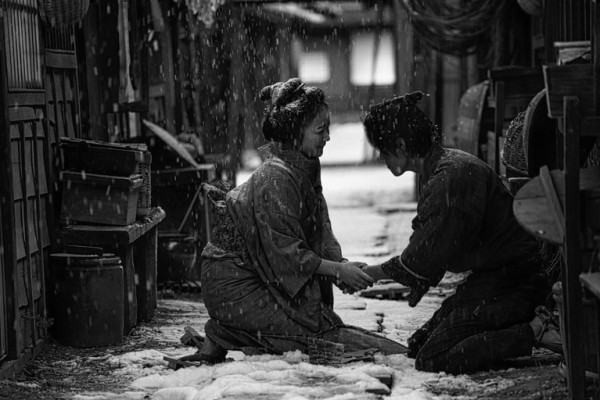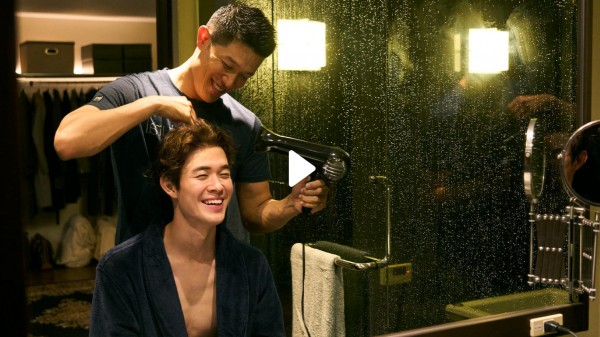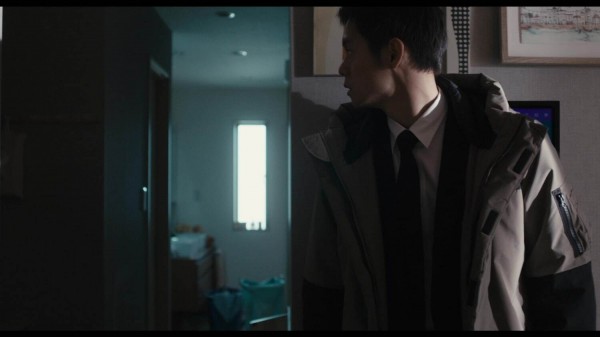-
NEW YORK ASIAN FILM FESTIVAL, July 1430, 2023
Last edited by Chris Knipp; 08-20-2023 at 04:45 PM.
-
A-TOWN BOYZ (Eunice Lau 2023)
EUNICE LAU: A-TOWN BOYZ (2023)

TWO OF THE RAPPERS IN A-TOWN BOYZ
A different Asian-American reality - in the South
A 2015 NBC TV feature story shows this is a project that goes back many years. (Eurice Lau's interest in the problems of Asian Americans in Atlanta actually goes back to 2010.) It got a boost from Spike Lee then, and now we have this in-depth documentary about Asian rappers in Atlanta and the gangs they came from, rival Korean, Cambodian, and Vietnamese ones, and how they developed. It's a different picture of Asian immigrant life, far from the image of the perfect family that sends its children to Ivy League schools and instead strives so desperately to start a cleaning business or a jewelry wholesaler that the kids were left in a crib in day care till eleven p.m., crying. They grew up angry, and they joined the various local Asian gangs, which are growing larger.
Georgia gun laws allow gangs to shoot back when attacked: it's legal. A horrifying example of where liberality about guns in America is leading.
Spike Lee told Eunice Lau - a tough lady in a black leather jacket whose English is accented - that "it's not about the rap." "No, it's not about the rap," she agreed, "It's about the struggle. Sharply formatted individual interviews and profiles show the depth of Lau's work here, and we hear from the parents, too. The gangs carry out criminal activity, so group photos have blacked-out faces for anonymity. The splashy intertitles add kick and are unusual for a documentary.
The film follows one progression of a young Asian rap group to a performance at The Velvet Room, a serious mainstream venue, marking their entrance into 'mainstream' rap. But somehow it does not go so well. Further episodes lead to a number of the 'boyz' featured in the film, Vickz, Bizzy, and Eugene getting in trouble with the law and doing jail time. After they get out they tell what it was like. As Asians they were in an extreme minority. Vickz's father buys a restaurant to work with him for a straight life, but Vickz quits after a few months and goes back to rap to 'be my own boss.'
A-Town Boyz, 72 mins., premieres at the New York Asian Film Festival on July 23, 8.30pm ET at Lincoln Center's Walter Reade Theater.
WORLD PREMIERE · Q&A WITH EUNICE LAU

THE SPASHY INTERTITLES ADD KICK
Last edited by Chris Knipp; 07-17-2023 at 01:01 PM.
-
NOMAD (Patrick Tam 1982)
PATRICK TAM: NOMAD (1982)

CECILIA YIP, LESLIE CHEUNG IN NOMAD
Jeune et joli - a Hong Kong idyll from the early eighties
This new restoration of the 1982 film of Patrick Tam, Nomad, made in Panovision, is of interest because Tam was a mentor of Wong Kar-wai of the Hong Kong New Wave, and it includes a young Leslie Cheung, before he became famous.
As Simon Abrams says in his RogerEbvert.com NYAFF preview, it also features a "well-synthesized combination of sunny teen melodrama and arthouse sex comedy" - whatever that means, exactly. It's an odd but curiously fascinating mixture. The opening comedy sequence of a gang of young women disrupting the life of a young male lifeguard at a pool seems a bit unnecessary and overly boisterous but it ushers in Pat Ha (as Kathy) stealing the show as the sexy vixen who captures the heart of lifeguard Pong (Kent Tong). Most of the action, though including some oldsters, is about young couples, equally young and nubile, kissing and getting sexy, even on a bus, with a guy descending and exiting from a double decker with the girl still mounted on him. Though they get sexy, they also seem innocent and pure, especially the guys, most of all the pretty, almost feminine Cheung, who even then has something special about him. His girlfriend is called Tomato (Cecilia Yip).
At one point Louis (Cheung's character) gets pushed over a wall and badly knocked up. Only then, recovering in splints and cast, does he appear in the short shorts that the other guys are so often seen wearing, a fashion so out of style now it looks outrageous. There is a series of short scenes featuring one couple or another. Some are studying Japanese and several Japanese characters enter the not particularly organized story.
Then it turns out the "Nomad" people have been referring to is an antique sailing vessel owned by Louis' father, and the focus is what's going on on that now and the couples who remain on land. On the boat also, hiding, is the Japanese boyfriend who has deserted from the Red Army and as punishment is ordered to commit hara-kiri/seppuku. At the end that happens, in the goriest detail, the sweetness is over, and the action has turned horribly violent. Maybe this finale is "a prophetic lament," as Abrams says, foreshadowing grim developments and Hong Kong's loss of independence. It just seemed crazy to me, a punishing, doubtless tongue-in-cheek, change of genre and violation of decorum, proof that this film has been on its own wavelength all along.
Abrams points out that Nomad was Tam's third feature. It's a unique combination of sweet romance, sex, and gory violence that looks beautiful and remote in this handsome restoration.
Nomad, 96 mins., debuted Hong Kong November 26, 1982. Revived 2005 (Japan) and 2006 (Hong Kong). This 4K restoration, director's cut, debuted March 31, 2023 at the Hong Kong festival. Screened for this review as part of the 2023 New York Asian Film Festival.
Showtimes
Friday, July 21
3:45 PM Buy Tickets
Venue: Walter Reade Theater

LESLIE CHEUNG RESISTS THE SHORT-SHORTS STYLE AT FIRST IN NOMAD
Last edited by Chris Knipp; 07-14-2023 at 01:07 AM.
-
OKIKU AND THE WORLD/SEKAI NO OKIKU (Junji Sakamoto, 2023)
JUNJI SAKAMOTO: OKIKU AND THE WORLD せかいのおき (2023)

HARU KUROKI, KANESHIRO IN OKIKU AND THE WORLD
TRAILER [no subtitles]
TEASER
Japan's late Edo period seen from a new angle
The world of jidaigeki Japanese historical films is a tastily atmospheric one. This time stinkily atmospheric, and more original than most. Sekai no Okiku, which begins in 1858 in Edo (Tokyo) and environs, largely revolves around the very different way that human excrement was dealt with in those days. ("Shit" is the word in the subtitles so it must reflect blunt language in the Japanese.). Junji Sakamoto's mostly black and white square format film takes us into the much different and more basic world of the late Edo period, focusing on two shit dealers or 'manure men,' and Okiku (Haru Kuroki), a pretty temple schoolteacher, daughter of a discredited Samurai (Koichi Sato) living in a humble tenement, who suffers terrible misfortune but finds love. The Japan Times veteran film writer Mark Schilling links this film with the 1957 Kurosawa classic The Lower Depths; but it's sui generis, and graphic enough to shock the squeamish.
The three are first united in front of an outhouse in a heavy rain. Chunji (Kanichiro), at this point a waste paper seller, stands on one side, Yasuke (Ikematsu Sosuke), `a manure seller with his two pots of shit, is on the other, and Okiku runs up, coming from the temple, too proper to say why she's really there. It's obvious Okiko, who remembers Chunji from the temple where he sells paper, fancies the lean, handsome young man, and scorns Yasuke.
Things change after that. Yasuke, who has just lost his partner, persuades the initially unwilling Chunji to join him in the more profitable manure trade. Okiko's father is murdered and her throat is slit, rendering her long ill and forever voiceless. A cross-class romance slowly, very slowly, grows up between Okiku and Chunji, though he feels unworthy. The sweet sentimentality of their love reminds me of something in De Sicfa's Miracle in Milan. They are reduced to emphatic gestures because she can't speak and he's illiterate. When she wordlessly proposes to him, he asks if she can teach him to read and write some time, and later he joins a class where she holds up her own handsomely brushed pages of calligraphic text to illustrate the stentorian lesson of the temple teacher (Maki Claude) - he's focusing on "world" - the word and the place - and some adults sit in the back behind the kids, generously welcomed as latecomers to literacy.
The manure men are scoffed at but not lacking in dignity. Chunji is, after all, good-looking, and has a natural grace. Chunji lives poorly but in town; Yasuko is more of a country bumpkin. Whether or not they scoff, the citizenry would be mired in shit and the farmers lacking in fertilizer without the manure men, who don't seem to have much competition.
This film is organized quaintly into short chapters - preceded by vertical, calligraphic titles - that end with a few seconds in color. It ranges from bawdy humor to historical examination to harsh social commentary to sentimental romanticism. The camera is often on the sludge Chunji and Yasuko deal in and their big ladles and double short barrels hoisted on shoulders. They must buy it, and the price goes up. They take it to sell to country farmers, and also spread it on cultivated fields - it's a world unlike ours, a simpler, more efficient time when waste is not wasted.
Many rude and comical mishaps occur, but we're never allowed to forget the unfair abuse heaped on the manure men, who as both orphans, are free but lonely, and still harbor emotional needs. There is an over-explicit aspect about all this, but the strength of the film is that it takes us so deep into the basics of a world whose simple lack of plumbing and flush toilets makes it so very different from ours. The filmmaker hasn't escaped the historical genre but he has made it feel different and fresh.
Okiku and the World せかいのおき, 90 mins., debuted at Rotterdam Feb. 1, 2023, released theatrically in Japan in April and afterwards shown at Jeonju and Shanghai .Screened for this review as part of the 2023 New York Asian Film Festival.
Showtimes
Sunday, July 16
2:30 PM, Walter Reade Theater
Q&A with Junji Sakamoto, who will be honored with NYAFF’s 2023 Screen International Star Asia Lifetime Achievement Award
Last edited by Chris Knipp; 07-15-2023 at 12:37 AM.
-
EGOIST / エゴイスト (Daishi Matsunaga 2022)
DAISHI MATSUNAGA: EGOIST/エゴイスト (2022)

RYOHEI SUZUKI, HIO MIYAZAWA IN EGOIST
[WARNING; SPOILERS]
Seeking family
Japan may not quite be where the West is on making gay films. Its macho culture is not where Hollywood is on gayness. Reviewing Egoist, Mark Schilling of Japan Times ("Layered LGBTQ drama offers bittersweet romance"), calling it "groundbreaking," comments that though Tom Hanks and Robin Williams scored points as famous straight actors playing gay characters in Hollywood movies, only straight Japanese actors (or at great risk closeted ones) could think of playing the roles of Kosuke (Ryohei Suzuki), the gay showboating fashion magazine editor, and Ryuta, the gay financially strapped young physical trainer here.
Egoist lives partly in an earlier era for gay films and partly not as indicated by the facts that it has graphic sex scenes one would not see in a movie of the time of Fassbinder, but its somewhat stilted and schematic plot seems Fassbinderish. One might see this as Franηois Ozon without the wit. The two men are easy contrasts, poised to satisfy different needs. Kosuke, the successful fashion magazine editor who has made it with the showcase apartment and designer-clothes-stuffed dressing room and dining-out rat pack, feels empty inside because his mother died when he was young. He has a remote relationship with his father , a cute, bespectacled oldster. The boyish, forever smiling Ryuta (Hio Miyazawa), who Kosuke hires as a physical trainer he knows to be cute and gay has neither education (even in physical training, though they meet when Kosuke hires him for that) nor financial security, but he has a mom he lives with and cares for. So Kosuke can fund Ryuta, and Ryuta and his mom can be a surrogate family for Kosuke.
This seems like a Fassbinder situation but Fassbinder would not have dared the full-on graphic sex scene director Matsunaga presents between the two men within the first twenty minutes. The bigger, stronger, older, richer Kosuke appears to be the bottom, the younger, more delicate seeming and presumably less experienced Ryuta starts things off by giving Kosuke a peck on the mouth out on the street and is the top, more than once in different positions, including in the shower.
Egoist goes out of its way to be full-on and up to date in its sex scenes. And there turns out to be plot logic in a surprise: browsing on a gay sex app Kosuke discovers Ryuta has another line of work as a call boy. That has to be gotten out of the way, Ryuta, confronted by Kosuke posing as a new trick, accepting a monthly stipend that allows the young man to rely on a less risquι and less lucrative job, which for some reason turns out to be working at a restaurant. Kosuke also seems to be a connoisseur of food: he's seen describing an exquisite creamy dessert to some other men (an intense little set piece), and another time gently admonishing Ryuta, perhaps only fit for relatively unskilled labor in a professional kitchen, for gulping rather than sipping an unspecified special white wine.
Obviously the high pitch of this film determines that this couple are not going to settle down to a life of calm domesticity sharing Ryuta's mother (Sawako Agawa, whom Schilling calls "wonderfully understated." She is certainly wonderful, later cooly deadpan and stoical. Ryuta takes Kosuke to dinner at the humble flat he shares with her, but nothing is openly revealed or discussed. The men's love may be obvious, but it cannot speak it name. Later Kosuke's financial support of Ryuta continues, though it's not clear how it's working.
The action keeps showing Kosuke acting as Ryuta's sponsor as much as his lover, now buying him a car so he can drive his mother to medical treatment she now needs. One day, just in time as it turns out, the two offhandedly declare mutual love. But another day Ryuta doesn't answer and Kosuke, knocking on the door, learns from Ryuta's mother that he has suddenly died. Kosuke breaks down at Ryuta's funeral and he and Ryuta's mother have the frank talk they couldn't have at the dinner.
This is another up to date moment. She turns out to have thoroughly liberal, understanding views and to have had a little conversation with her son after the dinner. She guessed the relationship and said it was important only that you love, not whom you love. Now, in one of the film's most intense and Japanese scenes, there is a verbal struggle at the little dinner table where Kosuke ends by literally begging Ryuta's mother to accept his financial support and explains that he needs this.
It's in the scenes between Kosuke and Ryuta's mother that the film, however "groundbreaking" in Japanese terms for its bold gay sex, becomes most interesting and most specific (and the meaning of the title emerges). And it's here that the rather plain and masculine Ryohei Suzuki as Kosuke, not altogether convincing as a gay fashionista (except when looking in mirrors or making up his eyebrows), becomes a real person as the helpful loving friend of an impecunious but outspoken older woman. These final moments are on a whole other level.
Egoist/エゴイスト, 120 mins., debuted at Tokya Oct. 27, 2022, released theatrically in Japan Feb. 10, 2023., also showing at Hong Kong, Taiswan, Italy, and Provincetown. Screened for this review as part of the 2023 New York Asian Film Festival.
Presented in the 20223 New York Asian Film Festival
Showtimes
Saturday, July 15
8:30 PM Standby Only
Venue:
Walter Reade Theater
NEW YORK PREMIERE · Q&A WITH DAISHI MATSUNAGA AND RYOHEI SUZUKI
Last edited by Chris Knipp; 07-15-2023 at 12:29 AM.
-
HOME SWEET HOME (Takumi Saitoh 2023)
TAKUMI SAITOH: HOME SWEET HOME スイート・マイホーム (2023)

MASATAKA KUBOTA IN HOME SWEET HOME
Nice variation on the haunted house genre
The Japanese can be superb at horror films - see Kiyoshi Kurosawa's Cure - and this is a fine one.
At first it seems like it's going to be a slight variation on the haunted house genre, only with a bright, 'perfect" new house with all sorts of climatic and security electronic gadgets. Simple, cheery Hiromi (Misako Renbutsu) chirps with awe and glee. She and Kenji Jiyosawa (Masataka Kubota from Takshi Miike’s First Love), a gym personal trainer and the young head of family have two little kids, Sachi, a child, and Yuki, a baby. When first lookin at sample houses, Hitomi is pregnant with Yuki.
The gadgetry of the house exhibits a passive menace. It's wonderment masks a potential invasion of privacy. Already you know there's trouble. But it's more complicated than that. And the early house-hunting and house-choosing scenes almost seem like a comedy, if one that can turn menacing.
But there is really much more than the menace of the house here as Kenji's whole world turns into a living hell, and Kenji is part of it too.
The delight of getting the new house is shadowed by the presence of Koichi Amari (Yohei Matsukado) - a menacing, jealous house sales agent, who resents a woman being chosen by the couple to design their new house, as well as represent the sale. After the grim, oily-faced Amamri and Kenji have had a hostile encounter, Amari is found dead. This is when Kashiwabara - a police inspector - first approaches ken to inform him.
Later he meets Ken and tells him Yurie Hara has been found hanged in her house. In shock, Ken says she would never do such a thing. But the videos have caused her husband to leave her; surely she was not very happy.
Ken happens to have been having an affair with Yurie Hara a now married woman; they meet for one last time. She looks unhappy. Later, they meet again and she is distraught. Videos of her and Ken have been sent around.
Ken's odd brother Saturu (Yτsuke Kubozuka), who looks like somebody in a horror movie, is crazy, but lives with their mother (Toshie Negishi). He thinks the world is full of "them," evil creatures out to get us. Ken takes him seriously, and Saturu finds the new house full of these unseen creatures.
While all this is going on externally, the film is exploring the house's dark and scary places too. It has them, low closets where Saturu and a child hid. A cellar and an attic. The cellar is dark too. The security cameras' four screens don't really show these dark recesses, or if they do, what's happening there would be invisible.
Ken rushes back to the house from a planned business meeting when his wife is on his cell, and she cries out to Yuki, as if in horror. When he gets to the house, there is a police cordon. His wife and kids are safe, taken to hospital for examination. But Saturu lies dead upstairs, stabbed in the back.
It's difficult to convey all this and how neatly it unfolds, how the house has a quiet life of its own apart from other events. There is no musical score. The unfolding events we follow through Kenji's viewpoint supply excitement enough. Masataka Kubota has a sensitive, mobile face. He seems quizzical, shocked, lost as these terrible and inexplicable curses befall his world.
After helming two singular films (Blank 13, Zokki) movie star Takumi Saitoh, who starred in last year's NYAFF film Shin Ultraman, embraces this sui generis combination of crime and horror genres with pleasing ease and confidence. In leading us on to hell, the film makes a particularly effective use of sudden stills to arouse doubt and surprise and evoke a world gone mad. Not up to Cure perhaps but this is sly, tasty, nasty stuff that warps the idea of family forever.
Home Sweet Homeスイート・マイホーム ("Sweet My Home"), 113 mins., was screened for this review as part of the Jul. 14-30, 2023 New York Asian Film Festival at Lincoln Center.
Showtimes:
Thursday Jul 27, 9:00pm
Walter Reade Theater
Intro & Q&A with director Takumi Saitoh.

MASATAKA KUBOTA IN HOME SWEET HOME
Last edited by Chris Knipp; 07-15-2023 at 02:27 AM.
 Posting Permissions
Posting Permissions
- You may not post new threads
- You may not post replies
- You may not post attachments
- You may not edit your posts
-
Forum Rules





 Reply With Quote
Reply With Quote








Bookmarks